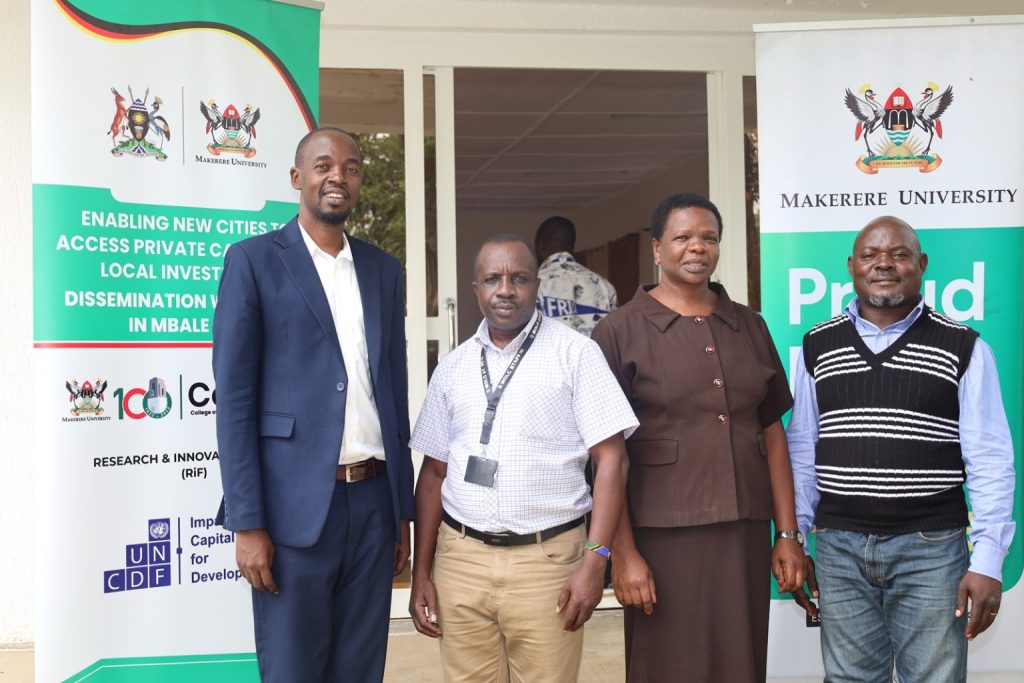Local governments across the country continue to struggle with funding for infrastructure development. The government of Uganda has been exploring ways to enhance the financial autonomy of local governments, including improving their capacity to borrow responsibly for development projects. This includes capacity-building initiatives and reforms to streamline the borrowing process albeit with little success. This is because of the stringent laws surrounding borrowing as well as the local government’s creditworthiness, which is influenced by factors such as revenue collection efficiency and financial management practices, affects its ability to borrow and the terms of borrowing.
It is against this background that researchers from the School of Business partnered with United nations Capital Development Fund to undertake a study on “Enabling new Cites to Access Private Capital for Local Investments.” The research team, led by Dr. Yusuf Kiwala, who undertook a study of Arua and Mbale city, have proposed a framework, which if adopted could help local government address their development challenges.
In a groundbreaking move, local governments in Uganda are set to revolutionize their approach to funding infrastructure projects with the introduction of a comprehensive financing framework. This new strategy aims to enhance collaboration between public and private sectors, ensuring sustainable development across the country.
Speaking during the dissemination workshop in Mbale City on August 1, 2024, Dr Kiwala while unveiling the framework said the new financing framework is built on several key elements, each designed to address specific aspects of funding infrastructure projects. These elements include the contribution of resources by various actors, diverse funding sources, external triggers of change, financing instruments, and financing structures.
- Actors Contributing Resources: The framework emphasizes collaboration and community engagement. It involves a range of stakeholders, including government entities, private investors, and commercial lenders, working together to pool resources and share risks.
- Funding Sources: The framework taps into multiple funding sources, both public and private. National, international, and local governments, along with donors and impact investors, are expected to play significant roles in financing infrastructure initiatives.
- External Triggers of Change: This element focuses on the various external factors that can initiate or accelerate infrastructure projects. These include regulatory changes, market forces, economic incentives, and financial reforms.
- Financing Instruments: A variety of financing instruments are available under the framework. These include grants, equity investments, short-term and long-term loans, user fees, loan rebates, bonds, and guarantees. This diversity allows for flexibility and adaptability in funding approaches.
- Financing Structures: The framework incorporates innovative financing structures such as pooled finance, special purpose vehicles, revolving funds, project finance, public-private partnerships (PPPs), and leasing arrangements. These structures are designed to enhance financial stability and efficiency in project implementation.

The new framework outlines specific mechanisms to operationalize these elements. These mechanisms include:
- Collaboration and community engagement to foster collective ownership of projects.
- Funding from a mix of government sources, donors, and commercial lenders.
- Regulatory and market-driven changes that create conducive environments for infrastructure investments.
- A wide range of financial instruments to meet the diverse needs of projects.
- Structured financing options to ensure robust and sustainable funding models.
Impact and Future Prospects
This innovative financing framework is poised to transform the landscape of infrastructure development in Uganda. By leveraging diverse funding sources and adopting flexible financing structures, local governments will be better equipped to undertake critical infrastructure projects that drive economic growth and improve public services.
The introduction of this framework also signals a shift towards more inclusive and sustainable development practices. With community engagement and risk-sharing at its core, the framework ensures that infrastructure projects are not only financially viable but also socially equitable.
As Uganda embarks on this new path, the success of the financing framework will likely serve as a model for other developing countries facing similar challenges in funding infrastructure development. The future looks promising as local governments, in collaboration with various stakeholders, pave the way for a brighter and more prosperous Uganda.
The Principal Assistant Town clerk – Northern Division, Ms. Annet Nandudu, expressed optimism for the future, saying that with continued collaboration and strategic planning, the challenges can be overcome. Ms. Nandudu the importance of transparency and accountability in the financing framework to ensure that resources are utilized efficiently and effectively. She also highlighted the need for ongoing capacity building to strengthen local government institutions and empower communities to participate in decision-making processes.
On his part, Mr. Julius Masereka, Principal Urban Officer, Ministry of Local Government, said the government was committed to the successful implementation of such initiatives. He emphasized the importance of collaboration between the government and local communities to ensure sustainable development. He called on the LGs to write bankable projects so that they can access funding from various sources and contribute to the overall development of their communities.
Research team
Dr. Yusuf Kiwala
Mr. Kanakulya Ronald
Ms. Maureen Nandaula
Dr. Kintu Ismail


